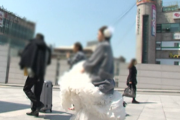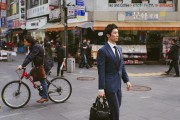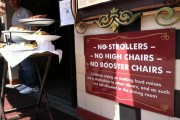The number of tourists to Korea has risen exponentially in recent years, fueled by Hallyu, or the Korean Wave. However, 40% of all tourists choose to not return to Korea. This report investigates the issue, and searches for some solutions.
**Please note that the bolded paragraph titles are not in the original translation and are included only to aid in organization. Also, foreign names written here may be misspelled, as they simply reflect the pronunciation of the transliterated original Korean text.**
Article from MBC:
The Korean tourism industry is growing ostensibly, while hiding its shameful reality.
Anchor: More than 12 million tourists visit Korea every year. The figure itself seems to show huge growth for the tourism industry in Korea.
However, only 40% of those tourists visit Korea again. In other words, 6 out of 10 don’t come back to Korea.
Is Korea treating foreign tourists well enough? Let’s look into the reality of tourism in Korea.
Illegal taxis and overpriced goods for tourists.[0:37]
Journalist: A Chinese tourist arrived at Incheon airport. As soon as he stepped out of the airport, a man approached.
An illegal cab driver: “Myeongdong, Myeongdong. 80,000 won for two people.” He took a van and there wasn’t a meter. It was an illegal call van.
When he arrived at a famous shopping mall, he couldn’t find any price tags on items for sale. He bought a summer jacket in one store.
The shop owner: “This jacket is 120,000 won. The price is so cheap compared to its high quality.” The Chinese man paid about 210,000 won for 3 pieces of clothing.
The journalist tried buying the same clothes in the same shop.
(Journalist: “How much is it?”)
Shop owner: “You can take it for 55,000 won, if you pay cash.” When the journalist bought the same clothes that the Chinese man did, the price was about 100,000 won cheaper.
Namdaemun market at nighttime. The Chinese man chose some knock-off brand name shoes.
The shop owner:“45,000 won. It is a real bargain.”
When a Korean man asked about the price, it was almost half.
The shop owner: “25,000 won. I can give you more of a discount.”
The Myeongdong area is brimming with solicitors. They keep following foreigners even though they say, “no”, or grab their hands or shoulders.
Yuan Siwei, a Chinese tourist: “I visited Korea since I like Hallyu. But despite my expectations, there are many things that disappointed me.”
To supervise illegal activity, a tourist police force was launched in October last year. In only 10 months, more than 900 cases of illegal activity were spotted.
One restaurant received more than 200,000 won from a customer who should have paid only 27,000 won.
Jeffrey, a tourist from Hong Kong: “I paid much more than I should have but the owner didn’t say anything. Later, I realized that I paid more.”
A taxi that turns off the meter when they have foreign customers is the usual subject of surveillance.
A foreign customer: “How much is it? 20,000 won?”
Due to poor treatment of its guests, the rate of repeated visits to Korea has been decreasing as time goes by, and is placed at the bottom among OECD countries.
Besides the low quality of restaurants, shops, and cabs, and there are even more problems.
Tourists also face challenges when looking for decent, affordable accommodations. [2:57]
At tourism’s essential core is a the need for a good night’s rest. This means high quality accommodations and a variety of options. Let’s look inside some accommodations in Korea. Reporter Jeon.
Reporter: I couldn’t find the place with the address information provided.
(Reporter)”Which building is it?”
The guest house owner:”I will come get you.” The place the owner showed me was a semi-basement flat in a terraced house.
Guest house owner: “We have been fully booked these days. There was someone staying in this room this morning.”
There was mold on the wall, a pillow, and a blanket covered with dirt. The owner asks 40,000 won for this room per night.
Another guest house is advertised as a modernized hotel on the internet.
(Reporter) “Has it been registered as a guest house?”
Staff: “Yes.”
It was really a sauna with a small portion illegally renovated. Only a bed could fit into a room so small. A foreign guest who believed the advert on the internet couldn’t hide his disappointment.
Tourist: “I found the cheapest accommodation on a hotel booking site. The place is so bad. There isn’t an air conditioner.”
1 in 5 foreign tourists who visited Korea last year stayed at a guest house. However, among the approximate 1,000 guest houses in Seoul, less than half of them have been zoned as a guest house.
Kyo-jeong Oh, head of the tourist police force: “Every year, the number of public complaints about accommodations has been reaching 100. Most of them are about a guest house. There is a need for more institutional support, such as revisions of the law.”
Demand is high for a unified quality assurance system. A look at Hong Kong. [4:24]
As these problems are worsening, the Tourism Board Organization are adopting a quality assurance system to guarantee the quality of accommodations or shops.
As you can see, there are four different systems, and even shopping malls run their own one. Too many systems are making tourists confused, and they are difficult to manage.
Let’s look at Hong Kong, where the quality warranty system has been running successfully. Reporter Lee.
Reporter: I visited a shop in Wan Chai, Hong Kong. Recently the number of foreign customers of the shop has increased 20% more than usual. The owner explains that the shop has received a QTS(Quality Tourism Services)seal from the Hong Kong Tourism Board.
Alexandra Mount, shop owner:“If people see the QTS sign, they see a shop providing a credible product as well as great service.”
QTS has been applied to shops, restaurants, and even accommodations. To be receive a QTS seal, shops must pass 16 tests for quality and service. Follow up for QTS-qualified shops is strict.
James Tung of the Hong Kong Tourism Organization:“To be registered and maintained as a QTS-qualified shop, a shop must pass many tests including a mystery shopper test.”
Hong Kong was once called “a heaven of imitation products.” After implementing the QTS system, Hong Kong’s image has changed, and income from tourism has increased nearly 4 times. It is thought that QTS, has been running successfully, and has brought the tourist industry of Hong Kong to a higher level.
In Korea, current quality assurance systems are failing. [5:50]
How about Korea? Police investigated a Korean restaurant for Chinese tourists only, qualified as an outstanding restaurant by Tourism Board Organization. In the kitchen they found food that had passed the expiration date, and even leftovers that had been stored in the freezer.
Police: “3 years has passed (since the expiration date), 3 years.”
Since the shop was designated as an outstanding restaurant, there has yet to be any follow-up or management of the situation. The same problem is occurring with accommodations. Among 70% with quality credentials have been reported for not meeting the requirements of a quality guarantee. Organizations awarding these credentials can also not be trusted, as each accommodation, restaurant, and shop are given their credentials from different organizations.
Hong-cheol Shin, student in the department of Hotel and Tourism at Kyung-Hee University: “If the systems for quality assurance in Korea were combined to make one system, it would be great. Then foreigners visiting Korea can develop a sense of trust when making purchases.”
The government has decided to loosen many regulations in order to raise the number of foreign tourists to 20 million by 2017. However, people point out that the government should combine all the quality assurance systems into one, and run it well.
Comments from Naver:
shfk****:
Merchants, don’t cheat foreigners. I know not all of you are like that but put yourselves in their shoes. It doesn’t feel good when we are ripped off while traveling.
wjdd****:
I have no idea why foreign tourists visit Korea. Korea has been trying so hard to catch up with western countries, so I don’t think there is much difference..
ltk1****:
Ah… well done…
daga****:
Aigo.. The fish always rots from the head down.
ph41****:
Follow the way Japan treats tourists. The Japanese are kind to tourists, and treat them like family. When I visited a sushi and a noodle restaurant in Tokyo, the staff greeted me so kindly.
kou7****:
From cabs to street vendors, they are like gangsters. We have no right to dispute this, though China or Japan discriminate against Korea, the level of Korea in tourism is at the bottom..yoo yoo
ecms****:
In Korea you are an idiot if you live conscientiously. There are so many successful people who are mean and two-faced. Koreans are frivolous and evil.
kuma****:
Southeast Asia and Europe have amazing natural environments. China and Japan have been preserving their Asian ruins. Who is going to visit Korea again where nothing is preserved except Gyeongbuk Palace in the middle of a bunch of buildings in Seoul?
tjda****:
Those people call Chinese jang-gae. Look at yourselves, you will discriminated against.. eo-hyu
anil****:
Those people are degrading Korea’s image that was improved thanks to Koreans like Kim Yuna, Kim Su-hyeon, Chu Shin-su. Why are they so short-sighted? Are they running a business only for a short term? I’m ashamed.
vic9****:
Oh my, just shameful. I wouldn’t come if I were a foreigner, too. tsk..
pega****:
They cheat even those tiny little things? Control what they are doing. Give them a huge fine and close their businesses.
jay6****:
Oh my, this is why Korea is uncivilized.
dnfl****:
This is so Korean.
yout****:
Why do they even come to Korea? There’s nothing to see except Gyeongbuk Palace… People are cheating tourists.







